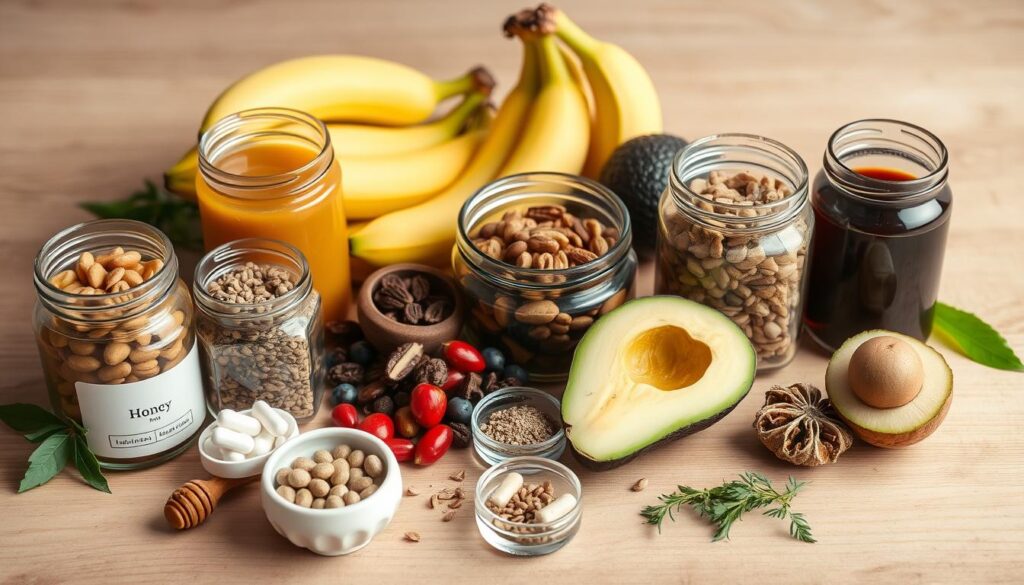Many women gain weight during their menstrual cycle. Hormones like estrogen and progesterone change. This can cause bloating, water retention, and cravings for sweet or salty foods.
It’s normal to gain 3-5 pounds during your period. Over 90% of women with periods face these symptoms. Knowing what happens can help you manage these changes.
Key Takeaways
- Period-related weight gain is a common experience, with most women gaining 3-5 pounds during their menstrual cycle.
- Hormonal fluctuations, water retention, increased appetite, and cravings can all contribute to weight changes around your period.
- Understanding the underlying causes can help you develop effective strategies to manage period-related weight fluctuations.
- Adopting healthy habits like staying hydrated, reducing salt intake, and exercising can help minimize weight gain during your period.
- Seeking medical advice may be necessary if you experience severe or debilitating premenstrual symptoms.
Understanding Period-Related Weight Fluctuations
Many women gain weight before their period. This is normal and happens to up to 90 percent of women. Symptoms like bloating, headaches, and mood swings are common.
Normal Weight Gain During Menstruation
Before your period, you might gain 3 to 5 pounds. This weight usually goes away a few days after your period starts. Hormonal changes, like estrogen and progesterone, cause this water retention.
Duration of Period Weight Changes
Weight changes from your menstrual cycle are short-lived. They can last from a few days to two weeks. Low calcium and magnesium levels can make symptoms worse, like weight gain and bloating.
Impact on Body Composition
The weight gain during your period is mostly water. It’s not extra fat. A 1.5-3kg weight increase is normal. Knowing this can help you manage your weight better.
| Symptom | Percentage of Women Affected |
|---|---|
| Swelling/Bloating | 65% |
| Weight Gain | 3-5 lbs |
| Mood Swings | Up to 90% |
| Headaches | Up to 90% |
Understanding your menstrual cycle’s weight changes helps. You can keep a healthy lifestyle all month long.
Hormonal Changes and Their Effect on Body Weight
Hormonal changes can make your weight go up and down during your menstrual cycle. When estrogen and progesterone levels drop before your period, it can cause water retention. This might make you weigh a bit more.
Progesterone makes you hungry. And when estrogen levels go down, you might want to eat more carbs. These changes can make you eat more and gain weight during your cycle.
| Hormone | Effect on Weight |
|---|---|
| Estrogen | Decreased levels can lead to water retention and fluid imbalance. |
| Progesterone | Increased levels can stimulate appetite and cravings. |
| Serotonin | Decreased levels due to lower estrogen can increase cravings for high-carbohydrate foods. |
These changes can make you eat more and gain weight during your cycle. But this weight change is usually short-lived. It will go back to normal once your cycle ends.
“Hormonal imbalances can impact weight, leading to symptoms like unexplained weight gain or loss, fatigue, and more.”
Common Causes of Weight Gain Period
Have you seen the scale go up before your period? You’re not alone. Hormonal changes and other body shifts can make you gain weight. Let’s look at why this happens.
Water Retention and Bloating
Water retention is a big reason, affecting 92% of women with periods. Hormones, especially progesterone, make your body hold more water. This leads to bloating and a puffy look. You might notice it most in your belly, breasts, and hands and feet.
Increased Appetite and Cravings
Hormonal changes can make you hungrier and crave bad foods. This can lead to eating more calories. It’s easy to gain weight because of this.
Metabolic Changes
Your metabolism might change a bit during your cycle. It can slow down a little before your period. This means you might burn fewer calories. This can cause small weight changes.
Water retention, hunger, and metabolism changes all play a part in weight gain before your period. Knowing why helps you handle these changes better.
“Even though weight gain before the menstrual cycle is often physiological and temporary, attention to diet, rest, and exercise is recommended to avoid persistent weight gain.”
The Role of Estrogen and Progesterone
It’s important to know how hormones like estrogen and progesterone affect your weight. These hormones help control your hormonal changes and body composition.
Estrogen helps keep the right amount of water in your body. It also affects how you feel and what you want to eat. When estrogen levels change, you might hold more water and feel bloated, leading to weight gain.
Progesterone makes you hungrier and can slow down how fast you digest food. This can cause constipation and more bloating. The balance between estrogen and progesterone affects your weight, hunger, and how your body looks during your cycle.
| Hormone | Effects on Weight and Body Composition |
|---|---|
| Estrogen | Regulates fluid balance, influences serotonin levels, and affects mood and appetite, leading to water retention and bloating. |
| Progesterone | Increases appetite and slows digestion, potentially resulting in constipation and bloating. |
Knowing how estrogen and progesterone work can help you deal with weight changes and other symptoms during your cycle. This knowledge helps you make better choices for your health.
“Hormonal fluctuations, particularly in estrogen and progesterone levels, can result in rapid weight gain during menopause.”
Physical Symptoms During Menstrual Weight Gain
When your menstrual cycle comes, you might feel more than just emotional changes. Hormonal shifts can cause physical symptoms, making you feel heavier. Knowing these changes can help you manage your body’s natural cycles better.
Abdominal Bloating
Abdominal bloating is a common symptom. Fluid buildup makes your belly feel swollen and uncomfortable. This can make your clothes feel tighter.
Breast Tenderness
Breast tenderness is another symptom. Hormonal changes make your breasts more sensitive and swollen. They might feel heavier and uncomfortable, especially in a bra.
Water Retention in Extremities
You might also notice water retention in your hands, feet, and legs. This can make these areas feel puffy and swollen. It adds to the feeling of weight gain during your period.
These symptoms, along with stomach issues like constipation or diarrhea, can make you feel heavier. Understanding and managing these changes can help you feel more comfortable and in control.
| Physical Symptom | Timeframe | Potential Causes | Management Strategies |
|---|---|---|---|
| Abdominal Bloating | 1-2 days before period, lasting up to 3-5 days | Fluid retention due to hormonal changes | Limit salt intake, stay hydrated, gentle exercise, diuretic-rich foods |
| Breast Tenderness | 1 week before period, lasting up to 3-5 days | Hormonal fluctuations, particularly increase in progesterone | Wear supportive bra, apply warm compress, consider magnesium supplements |
| Water Retention in Extremities | 1-2 days before period, lasting up to 3-5 days | Fluid buildup due to hormonal changes | Limit salt intake, engage in light exercise, elevate legs, diuretic-rich foods |
Dietary Strategies to Manage Period Weight
Eating well is key during your period to handle weight changes. Eat complex carbs to feel better and want less food. Also, eat foods rich in calcium like yogurt and greens to help your bones and ease cramps.
Try to eat less of foods high in salt, sugar, and bad fats to avoid bloating. Drinking less caffeine and alcohol can also help with PMS symptoms. Eating small meals often keeps your blood sugar steady and hunger away.
More magnesium can help with bloating and other symptoms. Find magnesium in nuts, seeds, whole grains, and greens. By watching what you eat and drink, you can handle macronutrient intake and keep a healthy calorie surplus during your period.
| Dietary Strategies | Benefits |
|---|---|
| Increase complex carbohydrates | Reduces mood symptoms and food cravings |
| Eat more calcium-rich foods | Supports bone health and alleviates cramps |
| Limit processed, high-salt, and sugary foods | Minimizes water retention and bloating |
| Consume less caffeine and alcohol | Helps manage PMS symptoms |
| Increase magnesium intake | Alleviates bloating and other premenstrual issues |

Adjusting your diet to your period can help with weight and discomfort. Stay hydrated, eat nutrient-rich foods, and change your diet as your body needs. This way, you can feel better and handle your period’s changes.
Exercise Recommendations During Your Period
Staying active during your period can help with weight gain and symptoms. Even when you feel tired, the right exercises can help a lot.
Best Types of Physical Activity
Try low-impact exercises like walking, swimming, and yoga. They help with cramps and keep you moving. Strength training, done twice a week, also keeps muscles strong and metabolism up.
Workout Intensity Guidelines
Pay attention to how you feel and adjust your workouts. Your ability to exercise doesn’t change much, except for endurance events. For those, you might find it harder in hot, humid weather.
Do 30 minutes of moderate activity each day or 75 minutes of vigorous activity weekly. Watch for changes in your energy levels.
Exercise can ease menstrual pain, cramps, and mood swings. Eating well, with foods like omega-3s, calcium, and vitamin D, also helps. Always talk to your doctor before trying new supplements.
| Recommended Exercise Types | Workout Intensity Guidelines |
|---|---|
|
|
“Regular exercise may potentially help reduce painful menstrual cramps for some women.”
Natural Remedies and Supplements
If you’re dealing with weight gain and hormonal changes during your period, natural remedies and supplements might help. Options like magnesium and herbal teas can ease symptoms like bloating and water retention. They can also help with sugar cravings.
Magnesium supplements can cut down on water retention and bloating. Your doctor might also suggest diuretics to help with water weight. Some birth control pills can also help with these symptoms.
- Herbal teas like ginger or peppermint can ease digestive issues and bloating.
- Supplements like inositol, cinnamon, turmeric, and evening primrose oil can help with menstrual cycles.
- A good B-complex supplement can support your body during hormonal changes.
Always talk to a healthcare professional before trying new supplements. They can make sure they’re safe and right for you.
“Incorporating natural supplements and remedies can be a great way to manage period-related weight gain and other symptoms, but it’s crucial to do so under the guidance of a qualified healthcare provider.”

While natural options can help, they shouldn’t replace medical advice. Work with your healthcare team to find the best way to handle hormonal changes and weight shifts during your period.
Lifestyle Changes to Minimize Weight Fluctuations
Keeping a steady lifestyle helps manage weight changes, especially with your menstrual cycle. Healthy habits reduce hormonal effects and boost well-being.
Sleep Quality Importance
Good sleep quality helps control weight and lowers cravings. Try for 7-9 hours of sleep each night. A regular sleep schedule and calming bedtime routine can improve your sleep.
Stress Management Techniques
Stress can affect your weight, causing more cortisol and water retention. Use stress-busting methods like meditation, deep breathing, or yoga. These can lower cortisol and reduce stress effects.
Staying active and eating well all month can also help. By making lifestyle modifications, you can manage your lean mass gain and feel great during your cycle.
“Weighing yourself at least once a week and recording the weight on the same day at the same time can help track weight trends.”
| Lifestyle Factor | Impact on Weight Fluctuations |
|---|---|
| Sleep Quality | Improved sleep can help regulate hormones and reduce cravings, minimizing weight fluctuations. |
| Stress Management | Effective stress management techniques can lower cortisol levels and mitigate the effects of stress on weight. |
| Consistent Exercise | Regular physical activity can help maintain a healthy weight and balance hormones during the menstrual cycle. |
| Healthy Eating Habits | Consuming a balanced diet rich in whole, nutrient-dense foods can minimize water retention and cravings. |
By making these lifestyle modifications, you can control your lean mass gain and feel great during your menstrual cycle. Remember, being consistent is crucial for managing weight changes.
When to Seek Medical Advice
Weight changes during your period are common and usually okay. But, watch out for severe or long-lasting symptoms. If you’re gaining too much weight period or other bad symptoms, see a doctor.
Unexpected weight gain or bad bloating might mean a health problem. If trying to manage it yourself doesn’t work, get help. A doctor can check you, find the cause, and help you feel better.
If you have really bad or long-lasting symptoms, like too much cramping or bleeding, see a doctor. They can help you deal with period weight gain and other problems. This way, you can feel good all month.


A Life-Changing Experience with This Weight Loss Supplement (Nagano Tonic)
I’ve always struggled with finding a weight loss solution that actually works for me. Like many, I’ve tried numerous diets, exercise routines, and supplements over the years—some worked for a short time, but nothing ever gave me long-term results. That was until I decided to try the weight loss supplement I found : Link to the Supplement.
From the moment I started using it, I noticed a difference. Not only did I feel more energized, but my cravings also became more manageable. The best part? I started seeing results much quicker than I anticipated! Over the course of just a few weeks, I noticed a significant reduction in belly fat and overall weight loss that I hadn’t been able to achieve before.
What makes this supplement stand out from all the others I’ve tried is how it supports me in my daily routine without any jitters or energy crashes. I’m able to stay focused and motivated, which has made it easier to stay on track with my diet and exercise plan.
This product truly exceeded my expectations, and I feel more confident and healthier than ever before. If you’re struggling with your weight loss journey like I was, I highly recommend giving this supplement a try. It’s been a game-changer for me, and I’m sure it can work wonders for you too!
Contant Them on email .. tonicnagano50@gmail.com
I was skeptical at first, but this supplement has truly made a difference in my weight loss journey. I’ve lost weight without feeling deprived or sluggish. My cravings are under control, and I feel more confident in my body. It’s easy to incorporate into my daily routine, and the results speak for themselves. I’m so glad I gave it a try!
Thanks David, i do use the link to make my purchase. you can get too here http://surl.li/iasppy
I’ve tried so many weight loss products, but this one has been by far the most effective. In just a few weeks, I’ve noticed a visible difference in my body and energy levels. It’s helped me stay on track without the constant hunger pangs and cravings. I’m really happy with my progress and can’t wait to see where I’ll be in another month!
This Nagano Tonic has been amazing! In just a few weeks, I’ve lost weight, feel more energized, and my cravings are under control. Highly recommend it!
Thats the link to purchase http://surl.li/iasppy
I’ve tried so many weight loss products over the years, but nothing worked like this supplement! Since I started using it, I’ve noticed a big difference in my energy levels and appetite control. In just a few weeks, I’ve lost weight and feel so much better. It’s been easy to stick with, and the results speak for themselves. Highly recommend this to anyone looking to make a real change!